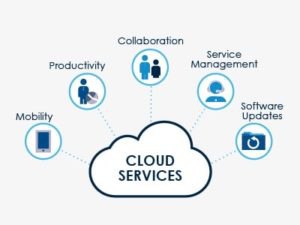Thinking About the Cloud?
Every day you hear more and more about the cloud. Companies are changing the way they do business. Many people think this transformation is due to the pandemic, but before the coronavirus crisis hit, it was already in motion.
Companies realize the many benefits of using the cloud, but new adopters have questions and concerns.
No matter where you are on your cloud journey, there are best practices and considerations to keep in mind. Understanding the cloud and its options helps you make the best decisions for your team now and into the future.
What is the Cloud?
The cloud is a virtual hub where you can host and store applications, documents, data, etc. It offers consistent accessibility supporting a work anywhere, work anytime environment. Users simply need an internet connection and login credentials.
In a physical sense, the cloud is a set of servers located off-site in a data center. There are three types of clouds: public, private, and hybrid.
- Public cloud: Cost-effective and scalable, you “rent” the space from a provider that controls your storage size and security measures.
- Private cloud: Dedicated to you and at a slightly higher price, this is space you own and control.
- Hybrid cloud: In a hybrid cloud environment, you may have public and private spaces, and decide what goes where. You can store proprietary or sensitive data in your private cloud space.
What are the Advantages of Cloud Computing?
The overarching benefit of the cloud is flexibility, secure architecture, and potentially, lower technology costs. To give you an idea about what analysts are saying about the cloud, consider this:
- Forbes. Com reports that 74 percent of technical CFOs (Chief Financial Officers) report that the cloud has a measurable impact on their business operations.
- IDG.com reports that 57 percent of cloud-using companies say its use improved customer support and continuity.
- Salesforce.com reports that 94 percent of cloud adopters experienced security and compliance improvements.
Because the cloud can represent a huge return on investment, it is definitely worth considering.
What does it Take to Migrate to the Cloud?
With any large-scale technology project, there are many moving pieces to consider when migrating to the cloud.
Create a List of Goals for Cloud Migration
A good first step is to create a list of goals to align your cloud migration with business objectives. Make sure to represent all of your stakeholders. Possible goals could include:
- Enabling easier remote work
- Reducing costs
- Improving security
- Growing your business
Assess Your Current Infrastructure
To move from on-premises to the cloud, it’s also a good idea to evaluate your current status and understand the differences between on-premises vs. cloud. It would be helpful to document how users interact with applications now, some of which may already live in the cloud. You may find it beneficial to develop use cases for the cloud. Doing so allows you to learn how employees use applications and where the challenges are in current practices.
Define the Type of Cloud and What Will Live There
You’ll need to determine what type of cloud meets your business objectives. Once you define your architecture, you’ll need to decide what applications, documents, or data will live there.
Chart out the path and think about the applications or data your team most uses and needs access to, whether they are in the office or working remotely. And if one of your primary goals for the cloud is to break down barriers for team members, consult with department heads and managers to see where their worlds intersect.
One cloud-built application is Unified Communications, also commonly referred to as UCaaS. A UCaaS platform offers communication tools (phone, video conferencing, instant messaging, etc.). That’s something you want all users to access from anywhere. It also provides secure document storage and sharing so teams can be productive as they work in various locations.
Develop a Migration Plan
Planning your migration should be something you document and strategize. You want this to be seamless and not cause any downtime. You’ll want to collaborate with your provider to ensure this occurs as efficiently and securely as possible. In this plan, you should detail your deployment, review any areas of risk, and craft communications to your end-users.
Want to Learn More About the Cloud Migration?
Having already performed this task for many of our clients, LDI Connect subject matter experts and specialists are available to answer your questions and address your concerns.
Book a Meeting with one of our Cloud Specialists today to learn more about Cloud Migration.
